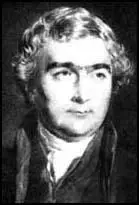Joseph Gurney

Joseph John Gurney was born at Earlham Hall, Norwich on 2nd August, 1788. Joseph was the tenth child of John Gurney, a successful banker and a prominent member of the Society of Friends. Joseph was the brother of Elizabeth Fry and Hannah Buxton, the wife of Thomas Fowell Buxton.
Joseph's mother died when he was a child and he was mainly raised by Elizabeth, who was eight years older than her brother. At an early age Joseph showed concern for the poor and badly treated. Elizabeth later recalled that as a child Joseph refused to take sugar in his tea because of the "poor slaves".
Joseph Gurney was educated at Oxford University but as a Quaker he was not granted a degree. He joined the family bank and in 1805 he became a partner in the business. With his sister, Elizabeth Fry, Gurney played an active role in the prison reform movement. Gurney joined his sister's campaign to bring an end to capital punishment. They met several MPs but they found little support for a change in a system where people could be executed for over 200 offences, such as stealing clothes or passing a forged banknote.
In February 1817 Charlotte Newman and Mary Ann James were sentenced to death for forgery. Gurney and Fry campaigned to have these women prisoners reprieved but they were unable to save them from the gallows. The following month they took up the case of Harriet Skelton, a maidservant to a solicitor, who had passed forged banknotes under pressure from her husband. Gurney and Fry, visited Lord Sidmouth, the Home Secretary, and pleaded for her life. Sidmouth rejected their arguments and insisted the execution went ahead. In the House of Lords Sidmouth warned that reformers like Fry and Gurney were dangerous people as they trying to "remove the dread of punishment in the criminal classes."
Lord Sidmouth's successor as Home Secretary, Sir Robert Peel, was much more sympathetic to the views of Gurney and introduced a series of reforms including the 1823 Gaols Act. As a result of the legislation introduced by Peel, there were regular prison inspections, gaolers were paid (before they were dependent on fees from the prisoners) and women warders were put in charge of women prisoners.
Peel's reforms did not apply to debtors' prisons or local town gaols. Gurney and Fry now went on a tour of British prisons in order to obtain the evidence needed to persuade the government to introduce further legislation. At Aberdeen, the county gaol was housed in an ancient, square tower. In the woman's room, which measured fifteen feet by eight, they found five women and a sick child. At Newcastle-upon-Tyne, prisoners had no space to exercise. In Glasgow, Nottingham, Sheffield, Leeds, York and Liverpool, Fry found conditions as bad, if not worse, than Newgate. After their tour, Fry and Gurney, published a report of what they found in their book, Prisons in Scotland and the North of England.
According to his biographer, Edward H. Milligan: "On the death of his father (whose business acumen he inherited) he became master of Earlham Hall, which was to be his home until his death. His investment policies enabled Gurney's Bank to weather the storm in the national financial crisis of 1825 - and also, incidentally, enabled him to rescue Joseph Fry's London tea and banking business, though his brother-in-law's continued imprudence led to bankruptcy three years later."
Gurney became a minister for the Society of Friends. He joined with Thomas Fowell Buxton and Thomas Clarkson in the struggle against the slave-trade. Gurney made several visits to North America and the West Indies where he campaigned against slavery. He also toured Ireland, Scotland, Holland, Belgium, Denmark and Germany, where he promoted Quaker views on world peace and the abolition of capital punishment. In 1833 he considered becoming the Whig candidate for the Norwich constituency. However, after long discussions with his friends he decided he could achieve more outside the House of Commons.
Slavery in the United States (£1.29)
Gurney wrote several books on religion and morality including: Essays on the Evidence, Doctrines and Practical Operation of Christianity (1825), The Moral Character of Jesus Christ (1832), and Religion and the New Testament (1843).
On 22nd December 1846, as Gurney was riding home from Norwich, his horse stumbled and threw him to the ground. He became seriously ill, dying at home on 4th January 1847.

